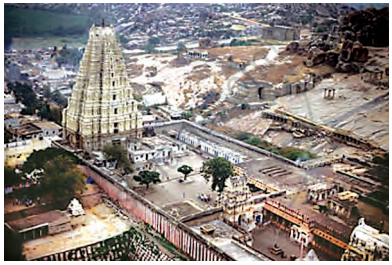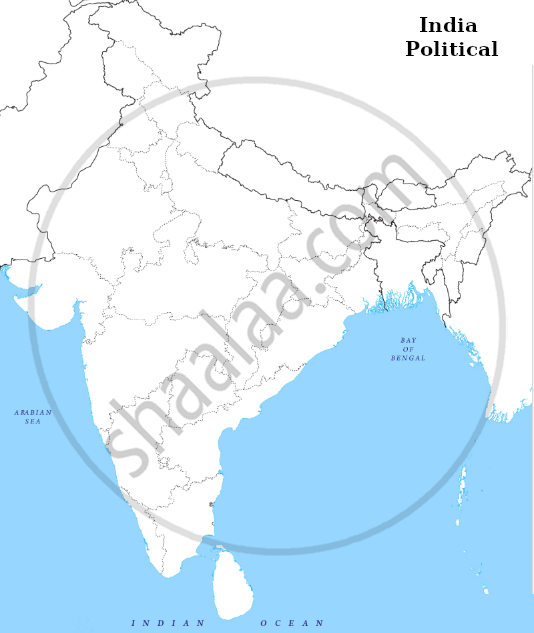Advertisements
Advertisements
Who among the following travellers was from Portugal?
Concept: Vijayanagara - the Capital and Its Environs
Which one of the following countries did 'Afanasi Nikitin' belong to?
Concept: Vijayanagara - the Capital and Its Environs
Which of the following statements regarding Krishnadeva Roy is incorrect?
Concept: Rayas, Nayakas and Sultans
Identify the given image of a temple from the following options:

Concept: The Sacred Centre
Which of the following are correctly matched?
- Cholas is Tamil Nadu
- Hoysala in Warangal
- Sultans of the Deccan
- Gajapati of Orissa
Concept: Rayas, Nayakas and Sultans
Why was Persian ambassador Abdur Razzaq greatly impressed by the fortifications of Vijayanagara empire? Explain.
Concept: Vijayanagara - the Capital and Its Environs
Which of the following crops were considered as jins-i-Kamil?
Concept: Peasants and Agricultural Production
Read the source given below and answer the questions that follow:
|
Darbar-i Akbari Abu'l Fazl gives a vivid account of Akbar's darbar: Whenever His Majesty (Akbar) holds court (darbar) a large drum is beaten, the sounds of which are accompanied by Divine praise. In this manner, people of all classes receive notice. His Majesty's sons and grandchildren, the grandees of the Court, and all other men who have admittance,' attend to make the kornish, and remain standing in their proper places. Learned men of renown and skillful mechanics pay their respects; and the officers of justice present their reports. His Majesty, with his usual insights, gives orders, and settles everything in a satisfactory manner. During the whole time, skillful gladiators and wrestlers from all countries hold themselves in readiness, and singers, male and female, are in waiting. Clever jugglers and funny tumblers also are anxious to exhibit their dexterity and agility. |
- How were the people informed about the conduct of the court?
- How was the social control exercised in the court?
- How did Akbar dispose of the appeals or cases in the court?
Concept: The Ain-i Akbari of Abu’L Fazl Allami
On the given political outline map of India, a capital of the Mughal Empire is marked as 'A'. Identify it and name it on the line drawn near it.

Concept: Land Revenue System
Match the following:
| List-I (Lands in Mughal Empire) |
List-II (Features) |
| i. Polaj | A. Land always being cultivated |
| ii. Parauti | B. Land fallow for three to four years |
| iii. Chachhar | C. Land fallow a year |
| iv. Banjar | D. Land uncultivated for five years |
Concept: Land Revenue System
Which of the following informations are correct about Ain-i-Akbari?
- Written by Abdul Razi in Arabic language.
- Manzil-abadi, concerns the imperial household.
- Sipah-abadi, covers the military and civil administrations.
- Mulk-abadi, deals with the fiscal side of the empire.
Concept: The Ain-i Akbari of Abu’L Fazl Allami
How revenue from the land was the economic mainstay of the Mughal Empire? Explain with examples.
Concept: Land Revenue System
Assertion (A): The book 'Sipah Abadi' was the important book on the military arid civil administration of the Mughals.
Reason (R): Book includes short biographical sketches of imperial officials like Mansabdars, Poets etc.
Concept: The Ain-i Akbari of Abu’L Fazl Allami
Answer In 100-150 words
Assess the role played by women of the imperial household in the Mughal Empire.
Concept: The Mughals and Their Empire
"The paintings in the Mughal Chronicles possess special powers to communicate ideas about the power of king and kingdom." Give arguments to support the statement.
Concept: The Painted Image
Examine how the lives of Paharias in the hills of Raj Mahal, were intimately connected to the forests.
Concept: The Hoe and the Plough
Arrange the following in chronological order and select the correct order from the following options:
- Santhal Rebellion
- Riots in Deccan Villages
- Permanent Settlement in Bengal
- First Revenue Settlement in Bombay Deccan
Concept: A Revolt in the Countryside the Bombay Deccan
Assertion (A): Zamindars defaulted on payments in the Permanent Settlement.
Reason (R): Prices of the agricultural produce were low.
Concept: Bengal and the Zamindars
Read the given source and answer the questions that follow:
|
From the Fifth Reports Referring to the condition of zamindars and the auction of lands, the Fifth Report stated: The revenue was not realised with punctuality, and lands to a considerable extent were periodically exposed to sale by auction. In the native year 1203, corresponding with 1796-97, the land advertised for sale comprehended a jumma or assessment of sicca rupees 28,70,061, the extent of land actually sold bore a jumma or assessment of 14,18,756, and the amount of purchase money sicca rupees 17,90,416. In 1204, corresponding with 1797-98, the land advertised was for sicca rupees 26,66,191, the quantity sold was for sicca rupees 22,74,076, and the purchase money sicca rupees 21,47,580. Among the defaulters were some of the oldest families of the country. Such were the rajahs of Nuddea, Rajeshaye, Bishenpore (all districts of Bengal), … and others, the dismemberment of whose estates at the end of each succeeding year, threatened them with poverty and ruin, and in some instances presented difficulties to the revenue officers, in their efforts to preserve undiminished the amount of public assessment. |
- Examine the reason for calling it as a 'Fifth Report'.
- Why were activities of East India company closely debated in England?
- Analyse any two limitations of this report.
Concept: Bengal and the Zamindars
Identify the British official with the help of the following information and select the correct option:
|
Concept: Bengal and the Zamindars
